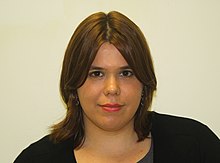Megan Schwamb
Megan Schwamb | |
|---|---|
 Schwamb in 2015 | |
| Born | 1984 (age 40–41) Huntsville, Alabama, U.S. |
| Alma mater |
|
| Known for | Discovery of 225088 Gonggong and other trans-Neptunian objects, Citizen Science projects, Astrotweeps |
| Awards | Carl Sagan Medal (2017) |
| Scientific career | |
| Fields | Planetary astronomy |
| Institutions | |
| Thesis | Beyond Sedna: Probing the Distant Solar System |
| Doctoral advisor | Michael E. Brown |
| Website | megschwamb |
Megan E. Schwamb (born 1984) is an American astronomer and planetary scientist, and lecturer at Queen's University, Belfast. Schwamb has discovered and co-discovered several trans-Neptunian objects, and is involved with Citizen science projects such as Planet Four and Planet Hunters.
Biography
[edit]In 2006, Schwamb graduated from the University of Pennsylvania with a B.A. summa cum laude with Distinction in physics. She went on to study astrophysics in the California Institute of Technology, graduated Master of Science in 2008. Schwamb finished her Ph.D. in planetary science in 2011, also from the California Institute of Technology. Her thesis was researching "Beyond Sedna: Probing the Distant Solar System",[1] and her advisor was Michael Brown.[2]
Between 2010 and 2013, Schwamb was a postdoctoral fellow at Yale University. She worked at the Institute of Astronomy and Astrophysics at Academia Sinica in Taipei in Republic of China (Taiwan) from 2013 until 2016.[3] Schwamb then held the post of assistant scientist at the Gemini Observatory,[2] before moving to Queen's University, Belfast. She is the creator and co-founder of Astrotweeps, a Rotation Curation account on astronomy.[4]
Schwamb is involved in citizen science projects. She is a founding science team member for Planet Four, a project intended for mapping seasonal fans on the South Pole of Mars.[2] She is also part of the science team leading Planet Hunters, a project in which users analyze data from the NASA Kepler Space Mission while searching for exoplanets.[5]
Awards and honors
[edit]In 2017 she received a Carl Sagan Medal for excellence in public communication, for the creation of the Astrotweeps and Planet Four projects.[4] On April 13, 2017, asteroid 11814 Schwamb, discovered by Schelte Bus at the Siding Spring Observatory in 1981, was named in her honor (M.P.C. 103979).[6][7]
Research discoveries
[edit]She specialized in studying sednoids,[1] and co-discovered several trans-Neptunian objects.[8][9]
List of discovered minor planets
[edit]Megan Schwamb is credited by the Minor Planet Center with the discovery and co-discovery of 16 minor planets during 2007–2010 (see list).[8] In addition to the confirmed discoveries, she also participated in the first observations of the unnumbered objects 2008 ST291, 2012 HG84 and 2012 KU50.
| (187661) 2007 JG43 | May 10, 2007 | list [A][B] |
| 229762 Gǃkúnǁʼhòmdímà | July 17, 2007 | list [A][B] |
| 225088 Gonggong | July 17, 2007 | list [A][B] |
| (305543) 2008 QY40 | August 25, 2008 | list [A][B] |
| (315530) 2008 AP129 | January 11, 2008 | list [A] |
| (382004) 2010 RM64 | September 9, 2010 | list [B][C] |
| (386096) 2007 PR44 | August 7, 2007 | list [A] |
| (445473) 2010 VZ98 | November 11, 2010 | list [B][C] |
| (471196) 2010 PK66 | August 14, 2010 | list [B][C] |
| (471210) 2010 VW11 | November 3, 2010 | list [B][C] |
| (499522) 2010 PL66 | August 14, 2010 | list [B][C] |
| (504555) 2008 SO266 | September 24, 2008 | list [A][B] |
| (508338) 2015 SO20 | October 8, 2010 | list |
| (523618) 2007 RT15 | September 11, 2007 | list [A][B] |
| (523629) 2008 SP266 | September 26, 2008 | list [A][B] |
| (528381) 2008 ST291 | September 24, 2008 | list [A][B] |
| Co-discovery made with: A M. E. Brown B D. L. Rabinowitz C S. Tourtellotte | ||
|---|---|---|
References
[edit]- ^ a b Megan E. Schwamb (2011). "Beyond Sedna: Probing the Distant Solar System" (PDF). California Institute of Technology. Retrieved January 25, 2018.
- ^ a b c "Megan E. Schwamb's CV". Archived from the original on October 18, 2018. Retrieved March 18, 2018.
- ^ "Megan E. Schwamb's Curriculum Vitae". www.astro.yale.edu. Retrieved March 21, 2018.
- ^ a b "2017 Prize Recipients". Division for Planetary Sciences of the American Astronomical Society. Retrieved March 21, 2018.
- ^ "About Planet Hunters - Teams". Planethunters.org. Retrieved March 21, 2018.
- ^ "11814 Schwamb (1981 EW26)". Minor Planet Center. Retrieved December 9, 2017.
- ^ "MPC/MPO/MPS Archive". Minor Planet Center. Retrieved October 16, 2018.
- ^ a b "Minor Planet Discoverers (Alphabetically)". Minor Planet Center. May 24, 2019. Retrieved May 27, 2019.
- ^ "List Of Transneptunian Objects". Minor Planet Center. Retrieved January 25, 2018.
External links
[edit]- 1984 births
- Living people
- American women astronomers
- Discoveries by Megan E. Schwamb
- Discoverers of minor planets
- American women planetary scientists
- 21st-century American astronomers
- 21st-century American women scientists
- People from Huntsville, Alabama
- Scientists from Alabama
- American planetary scientists
- University of Pennsylvania alumni
- California Institute of Technology alumni
- Yale University faculty
- Academics of Queen's University Belfast
